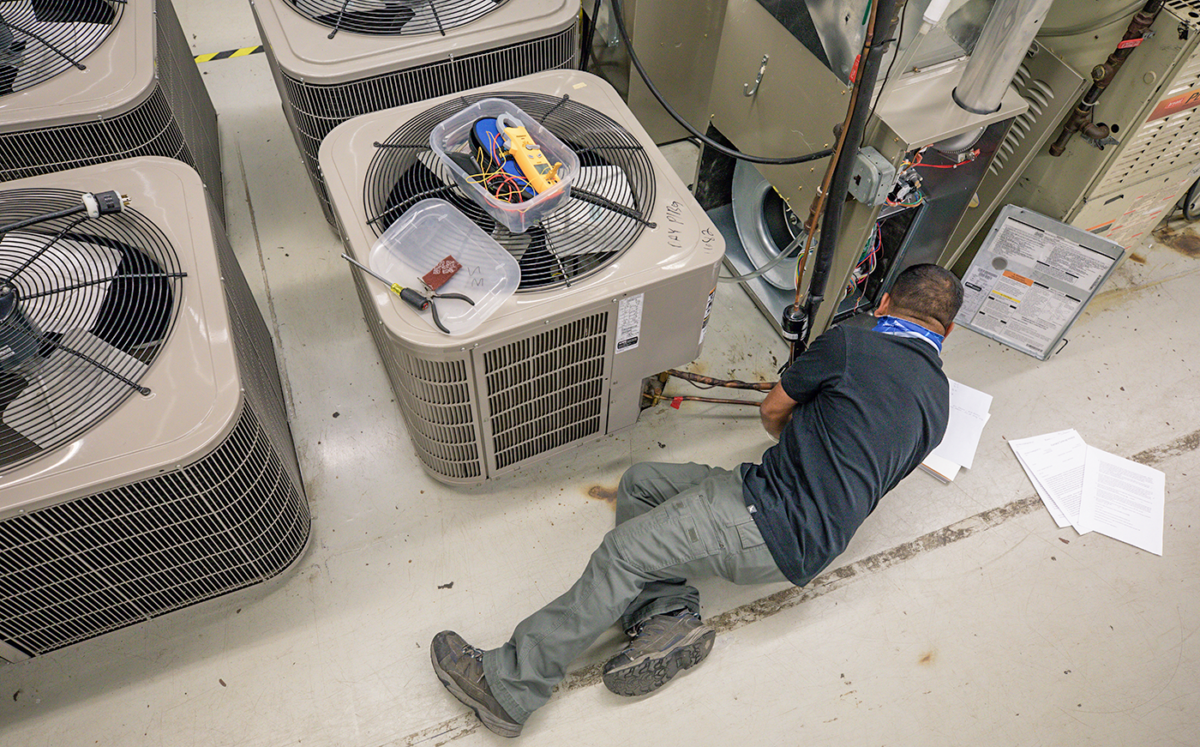From servicing to installation, careers in the HVAC industry are hotter than ever
If you haven’t heard, trained technicians in the HVAC (heating, ventilation, and air conditioning) industry are in high-demand and short supply. So if you’re considering your next career move, here are five reasons why you may want to take a closer look at the HVAC industry.
- You can make a difference in people’s lives. HVAC systems regulate and maintain the temperature and the air quality in most indoor spaces. During extreme weather conditions, HVAC systems also keep people safe. Good ventilation keeps our air clean and healthy to breathe, which is especially important in places like hospitals. These complex systems need specialized technicians to install, maintain, and fix them.
- Job security & great pay. According to a recent article in Axios, “The U.S. heating, air conditioning, and refrigeration industry will need tens of thousands of new workers in the coming years to replace those leaving the field for retirement or other professions, the U.S. Bureau of Labor Statistics and industry leaders estimate. The gap between supply and demand in Minnesota is expected to hit nearly 4,000 additional workers over the next decade, per the Department of Employment and Economic Development.” Dunwoody Senior Instructor William Bobick said his classes typically have a 100 percent job placement rate. “There’s so many people calling, [but] I only have so many students,” he said. Glassdoor.com reports average salaries for industry professionals at more than $80,000 in the Twin Cities metro area.
- You don’t want a desk job. HVAC technicians work in a wide variety of locations, often traveling to different work sites and interacting with new people. This also means they enjoy a lot of flexibility and independence in their workday.
- You like to solve problems. Whether you’re reading a blueprint and figuring out load calculations for a new install or trying to fix a system that is not working properly, the HVAC field provides lots of opportunity to put your problem-solving skills to the test. So if you like finding solutions to complex problems and using your technical skills to fix an issue, then you might find a career in HVAC a rewarding one.
- No two days are ever alike. The HVAC field is diverse and every project is unique. Since you’re working on a variety of systems for both cooling and heating, you’ll utilize a varied set of technical skills for each project. So if you enjoy variety in your workday, you won’t be disappointed with a career in HVAC.
Interested in learning more? Dunwoody College of Technology offers three tracks to working in this high-demand career field.
Sheet Metal & HVAC Installation certificate: In just two semesters, you’ll learn the skills needed to install residential and light commercial heating, ventilation, and air conditioning systems. You’ll learn blueprint reading, load calculations, warm air systems design, installation techniques, and fabrication skills.
HVAC Installation & Residential Service: This two-year Associate of Applied Science degree prepares graduates to work in a wide variety of fields, including residential, commercial, and industrial. Students in the program often receive internship opportunities after their first year in the program, and graduates are prepared to take the EPA Section 608 Certification.
HVACR Systems Servicing: This two-year Associate of Applied Science degree prepares graduates to maintain modern Heating, Ventilation, Air Conditioning, and Refrigeration systems as well as troubleshoot, diagnose, and correctly repair environmental and stand-alone cooling systems. Upon graduation, you will be prepared to take the Minnesota’s Special Engineers Boiler Operator License, which allows you to legally operate boilers; EPA Section 608 Certification by Esco Institute, which allows you to legally handle refrigerants, universally; and Hydrocarbon Refrigerants Certification, ensuring you have a solid understanding of the refrigeration cycle and proper handling of CFC, HCFC, and HFC refrigerants.
For more information about any of these programs, contact Admissions at admissions@dunwoody.edu or RSVP for our next Open House.
